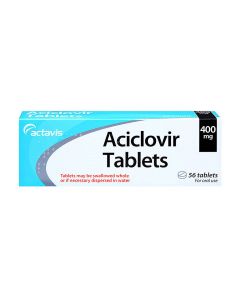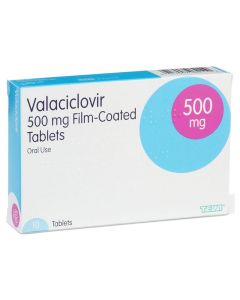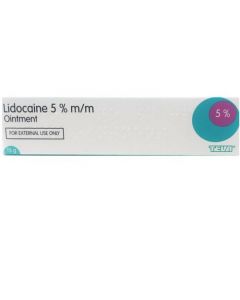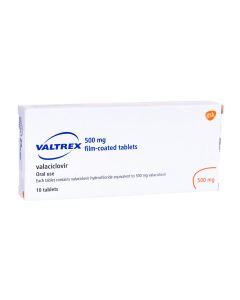Genital Herpes Treatment
Treatments
-
 Aciclovir Tablets (400mg)From As low as £18.99
Aciclovir Tablets (400mg)From As low as £18.99- Used to treat and prevent recurring outbreaks of Herpes
- Works by stopping the herpes virus from spreading
- Helps clear the signs and symptoms of herpes and cold sores
Please note brand received may vary
-
 ValaciclovirFrom As low as £44.99
ValaciclovirFrom As low as £44.99- Used to treat cold sores and the herpes simplex virus (HSV)
- Can be used to prevent a recurrence of HSV infection
- Reduces appearance and symptoms within 3 days
Please note brand received may vary
-
 Lidocaine 5% Ointment (15g)From As low as £14.99
Lidocaine 5% Ointment (15g)From As low as £14.99- Local anaesthetic
- Effective genital herpes treatment
- Ease of application
Please note brand received may vary
What is Genital Herpes?
Genital herpes, also referred to as just herpes, is a type of STI. It is caused by a virus, called the herpes simplex virus (HSV). Herpes simplex comes in two different forms; HSV1 and HSV 2. Both types infect what is called the mucous membranes of the body, so a place that has a moist lining, such as your mouth or genitals. The seriousness of the outbreak does not vary depending on the type you contract, and neither do the physical symptoms that come with it.
Both types are also highly contagious and are spread by an infected person having unprotected sex, whether that be oral, vaginal or anal sex with another person. A cold sore touching either a male or a female’s genitals can also spread the virus. The sharing of unclean or unprotected sex toys can also spread herpes simplex, as can a finger carrying the infection touching the genitals.
It is important to realise you can still catch the virus if there are no visible blisters or sores. This is because once you have the virus, it lives in your body permanently and becomes a lifelong condition. In most people, it will reoccur around five times in the first two years after infection and then reoccur less frequently from then onward. In some people, symptoms may not appear for months or even years after the first infection.
Genital Herpes Symptoms
You should visit a sexual health clinic if you have any of the following symptoms of genital herpes.
Primary infection symptoms may include:
- Blisters that are small and eventually burst, leaving open red sores. These blisters may form on your genitals, rectum, bottom and thighs. Once they have healed and scabbed over, these blisters do not leave scars.
- Pain when urinating
- Flu-like symptoms, such as aches and pains
- Unusual vaginal discharge (women only)
- Blisters and ulcers on the cervix (women only)
Recurrent infection symptoms may include:
- The same type of blisters
- Before blisters, a strange sensation around your genitals or legs that feels like itching, burning or tingling
- Blisters and ulcers on the cervix (women only)
Some herpes symptoms occur less frequently and less severely over time.
There are two types of outbreaks; the primary infection and the recurrent infection. A primary infection only happens once, the very first time your infection presents itself. This outbreak can last from a few days to 20 days.
The primary infection is typically more aggressive and painful than subsequent outbreaks. As a result you may be prescribed anti-inflammatory pain relief medicine along with a typical herpes treatment to help you cope with the pain and discomfort.
Symptoms of a recurrent infection are often much shorter and less severe because the body is already primed to attack the infection. All other outbreaks after this are called recurrent infections.
Genital herpes and pregnancy
HSV can lead to complications if you are pregnant, and can be passed to the baby near to the birth. If the primary infection occurred before you became pregnant, the risk to the baby is low. Protective antibodies are passed to the baby during the final months of gestation, meaning the baby will be protected during birth and the months afterwards. Even if genital herpes happens while you are pregnant, the risk is still low for your baby. Your doctor may prescribe you some medicine to reduce the symptoms. If you have blisters or sores during the birth, this increases the chance of passing HSV to the baby by 3%.
Genital herpes and breastfeeding
If you are breastfeeding, you are able to take Aciclovir for genital herpes. While it can get into your breast milk, it is not enough to cause any harm to the baby.
Genital Herpes Causes
The herpes virus is called herpes simplex, which is the cause of genital herpes. Once you catch this virus, it stays in your body. While it will not spread and create blisters on other parts of your body, it will stay in a nearby nerve and cause further blisters in the same area.
It is very contagious and can be passed on by various means, including:
- Sexual contact (skin-on-skin contact with the infected area, either by oral, vaginal or anal sex)
- If your genitals are touched by a cold sore
- Sharing sex toys with someone who already has the herpes virus
- Someone who has the infection on their fingers transferring it to your genitals
- When blisters or cold sores are not visible
You cannot catch genital herpes from the likes of cutlery, towels or cups; the virus does not survive for long when it loses contact with your skin.
Genital Herpes Diagnosis
A doctor will normally be able to diagnose herpes based on a physical examination.
They may also carry out some tests including:
- A blood test to check for HSV antibodies, which will show if you have had a herpes infection in the past
- Viral culture, where they take a tissue sample or scraping from a sore to be examined by a laboratory
- A PCR test, which involves copying your DNA from a blood sample, spinal fluid or a sore tissue; this determines if you have HSV and what type of strain you have
Once you have been diagnosed, they will be able to give you a prescription for an appropriate genital herpes treatment.
At Medicine Direct, one of our doctors can write you a prescription for an appropriate herpes treatment after an online consultation, where you will describe your symptoms and medical history. You can then order this treatment from our online pharmacy. Order online by 2pm for free next day delivery.
Getting a genital herpes test
Genital herpes does not always present itself as soon as you become infected. In fact, around 80% of people do not know they carry the virus until primary infection, because at first there may be no, or few, symptoms. If you develop blisters or sores, you should get tested immediately.
A herpes test could be done by a swab (cotton bud) taking fluid from the blister. If you don’t have any blisters, a blood test can be done. Some doctors will also be able to diagnose you just by looking at your blisters. Knowing if you have genital herpes will prevent you from spreading the virus to other sexual partners.
Genital Herpes Treatment
The herpes virus stays in your system once you contract it, but there are various medicines available to treat genital herpes during a flare up.
If you have been diagnosed with herpes for the first time, a doctor may give you a prescription for antiviral medication, to stop it from getting worse, and a topical cream for the pain.
Valaciclovir tablets, which can also be spelled Valacyclovir, can be used for both HSV-1 and HSV-2, as can Aciclovir tablets, which can also be spelled Acyclovir. These are antiviral drugs that slow down the spread of the virus to other parts of the body. They also treat the main symptoms of herpes. No medicine can cure the herpes simplex virus permanently.
Genital herpes treatment length
Valaciclovir tablets are a standard dosage of 500mg. These should be taken either once or twice each day, depending on your doctor’s instructions. This medicine can reduce your symptoms in as little as three days, but the exact amount of time you will need to take it for depends on your personalised prescription from a doctor.
Aciclovir tablets from Medicine Direct are 400mg. 200mgs of this medication must be taken five times a day, in four-hour intervals. You may need to take medication over more days if your condition does not improve. Alternatively, you may be prescribed a stronger dose of 400mg at each interval. The usual treatment length is five days, but if your condition does not improve this may need extending.
Side effects
Common side effects of Aciclovir may include:
- Headaches
- Dizziness
- Feeling or being sick
- Diarrhoea
- Skin being sensitive to sunlight
Common side effects of Valaciclovir include:
- Tiredness
- Concentration problems
- Loss of appetite
- Mood changes, such as feeling sad or empty, or irritability
- Discouragement
- Loss of interest or pleasure
- Trouble sleeping
What Medicine Direct can offer for genital herpes
You can purchase a course of tablets to help control the symptoms of herpes from Medicine Direct when you have a prescription. We have currently have two types of online herpes treatments available, which both slow the spreading of the virus to other parts of the body and relieve symptoms. We offer free delivery and discreet packaging, as well as a next day delivery option, so you can start treatment without delay.
Doctor Notes

Hussain Abdeh
Pharmacist
This content has been written by Hussain Abdeh and has been medically reviewed by Sonia Khan
View Profile




